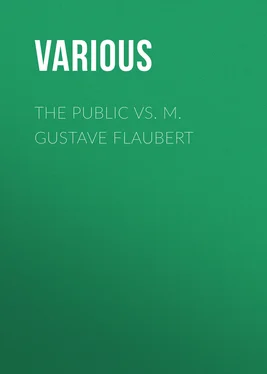Various - The Public vs. M. Gustave Flaubert
Здесь есть возможность читать онлайн «Various - The Public vs. M. Gustave Flaubert» — ознакомительный отрывок электронной книги совершенно бесплатно, а после прочтения отрывка купить полную версию. В некоторых случаях можно слушать аудио, скачать через торрент в формате fb2 и присутствует краткое содержание. Жанр: foreign_antique, periodic, foreign_edu, на английском языке. Описание произведения, (предисловие) а так же отзывы посетителей доступны на портале библиотеки ЛибКат.
- Название:The Public vs. M. Gustave Flaubert
- Автор:
- Жанр:
- Год:неизвестен
- ISBN:нет данных
- Рейтинг книги:5 / 5. Голосов: 1
-
Избранное:Добавить в избранное
- Отзывы:
-
Ваша оценка:
- 100
- 1
- 2
- 3
- 4
- 5
The Public vs. M. Gustave Flaubert: краткое содержание, описание и аннотация
Предлагаем к чтению аннотацию, описание, краткое содержание или предисловие (зависит от того, что написал сам автор книги «The Public vs. M. Gustave Flaubert»). Если вы не нашли необходимую информацию о книге — напишите в комментариях, мы постараемся отыскать её.
The Public vs. M. Gustave Flaubert — читать онлайн ознакомительный отрывок
Ниже представлен текст книги, разбитый по страницам. Система сохранения места последней прочитанной страницы, позволяет с удобством читать онлайн бесплатно книгу «The Public vs. M. Gustave Flaubert», без необходимости каждый раз заново искать на чём Вы остановились. Поставьте закладку, и сможете в любой момент перейти на страницу, на которой закончили чтение.
Интервал:
Закладка:
I have related the romance, I have brought a charge against it and, permit me to say, against the kind of art that M. Flaubert cultivates, the kind that is realistic but not discreet. You shall see to what limits he has gone. A copy of the Artiste lately came to my hand; it is not for us to make accusations against the Artiste , but to learn to what school M. Flaubert belongs, and I ask your permission to read you some lines, which have nothing to do with M. Flaubert's prosecuted book, only to show to what a degree he excels in this kind of painting. He loves to paint temptations, especially the temptations to which Madame Bovary succumbed. Well, I find a model of its kind in the lines to follow, from the Artiste , for the month of January, signed Gustave Flaubert , upon the temptation of Saint Anthony. Heaven knows it is a subject upon which many things might be said, but I do not believe it possible to give more vivacity to the image, stronger lines to the picture. Apollonius says to Saint Anthony:—
"What is knowledge? What is glory? Wouldst thou refresh thine eyes under the humid jasmines? Wouldst thou feel thy body sink itself, as in a wave, in the sweet flesh of swooning women?"
Ah! well! here is the same colour, the same strength of the brush, the same vivacity of expression!
To resume. I have analyzed the book, I have related the story without forgetting a page, I have then made the charge, which was the second part of my task. I have exhibited some of the portraits, I have shown Madame Bovary in repose, by the side of her husband, in contact with those whom she could not tempt, and I have pointed out to you the lascivious colour of that portrait! Then I have analyzed some of the great scenes: the fall with Rodolphe, the religious transition, the meetings with Léon, the death scene, and in all this I find the double count of offense against public morals and against religion.
I had need of but two scenes: Do you not see the moral outrage in the fall with Rodolphe? Do you not see the glorification of adultery in it? And then, the religious outrage, which I find in the drawing of the confession, in the religious transition, and finally, the scene of death.
You have before you, gentlemen, three guilty ones: M. Flaubert, the author of the book, M. Pichat who accepted it, and M. Pillet, who printed it. In this matter, there is no misdemeanor without publicity, and all those concerned in the publicity should be equally blamed. But we hasten to say that the manager of the Revue and the printer are only in the second rank. The principal offender is the author, M. Flaubert; M. Flaubert who admonished by a note from the editor, protested against the suppression which had been made in his work. After him comes M. Laurent Pichat, from whom you will demand a reason, not for the suppression which he has made, but of that which he should have made; and finally comes the printer, who is a sentinel at the door of scandal. M. Pillet, besides, is an honourable man against whom I have nothing to say. We ask but one thing of you, which is to apply the law to him. Printers should read; when they do not read or have read what they print, it is at their own risk and peril. Printers are not machines; they have a privilege, they take an oath, they are in a special situation and they are responsible. Again, they are, if you will permit the expression, like an advanced guard; if they allow a misdemeanor to pass, it is like allowing the enemy to pass. Make the penalty as mild as you will for Pillet, be as indulgent as you like with the manager of the Revue ; but as for Flaubert, the principal culprit, it is for him you should reserve your severities!
My task is accomplished; we await the objections on the part of the defense. The general objection will be: But after all the romance is moral on the whole, for is not adultery punished?
To this objection there are two replies: I believe that in a hypothetically moral work, a moral conclusion cannot be reached by the presentation of the lascivious details we find here. And again I say: that the work is not moral at the foundation.
I say, gentlemen, that lascivious details cannot be covered by a moral conclusion, otherwise one could relate all the orgies imaginable, describe all the turpitude of a public woman, making her die in a charity bed of a hospital. It would be allowable to study and depict all the poses of lasciviousness. It would be going against all the rules of good sense. It would place the poison at the door of all, the remedy at the doors of few, if there were any remedy. Who are the ones to read M. Flaubert's romance? Are they men who are interested in political or social economy? No! The light pages of Madame Bovary fall into hands still lighter, into the hands of young girls, sometimes of married women. Well, when the imagination has been seduced, when this seduction has fallen upon the heart, when the heart shall have told it to the senses, do you believe that cold reason would have much power against this seduction of sense and sentiment? And then, man should not clothe himself too much in his power and his virtue; man has low instincts and high ideas, and, with all, virtue is only the consequence of an effort ofttimes laborious. Lascivious pictures have generally more influence than cold reason. This is what I respond to that theory, that is, as a first response; but I have a second.
Конец ознакомительного фрагмента.
Текст предоставлен ООО «ЛитРес».
Прочитайте эту книгу целиком, купив полную легальную версию на ЛитРес.
Безопасно оплатить книгу можно банковской картой Visa, MasterCard, Maestro, со счета мобильного телефона, с платежного терминала, в салоне МТС или Связной, через PayPal, WebMoney, Яндекс.Деньги, QIWI Кошелек, бонусными картами или другим удобным Вам способом.
Интервал:
Закладка:
Похожие книги на «The Public vs. M. Gustave Flaubert»
Представляем Вашему вниманию похожие книги на «The Public vs. M. Gustave Flaubert» списком для выбора. Мы отобрали схожую по названию и смыслу литературу в надежде предоставить читателям больше вариантов отыскать новые, интересные, ещё непрочитанные произведения.
Обсуждение, отзывы о книге «The Public vs. M. Gustave Flaubert» и просто собственные мнения читателей. Оставьте ваши комментарии, напишите, что Вы думаете о произведении, его смысле или главных героях. Укажите что конкретно понравилось, а что нет, и почему Вы так считаете.












